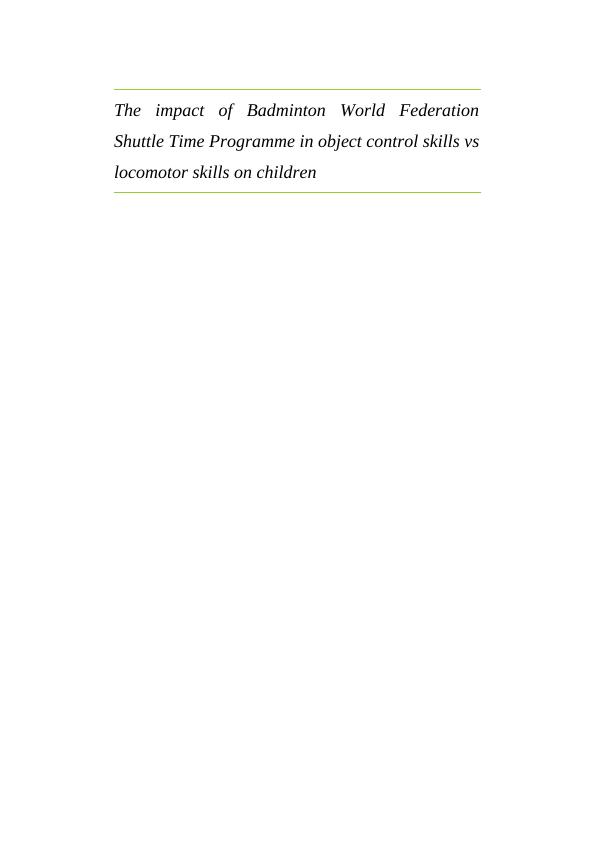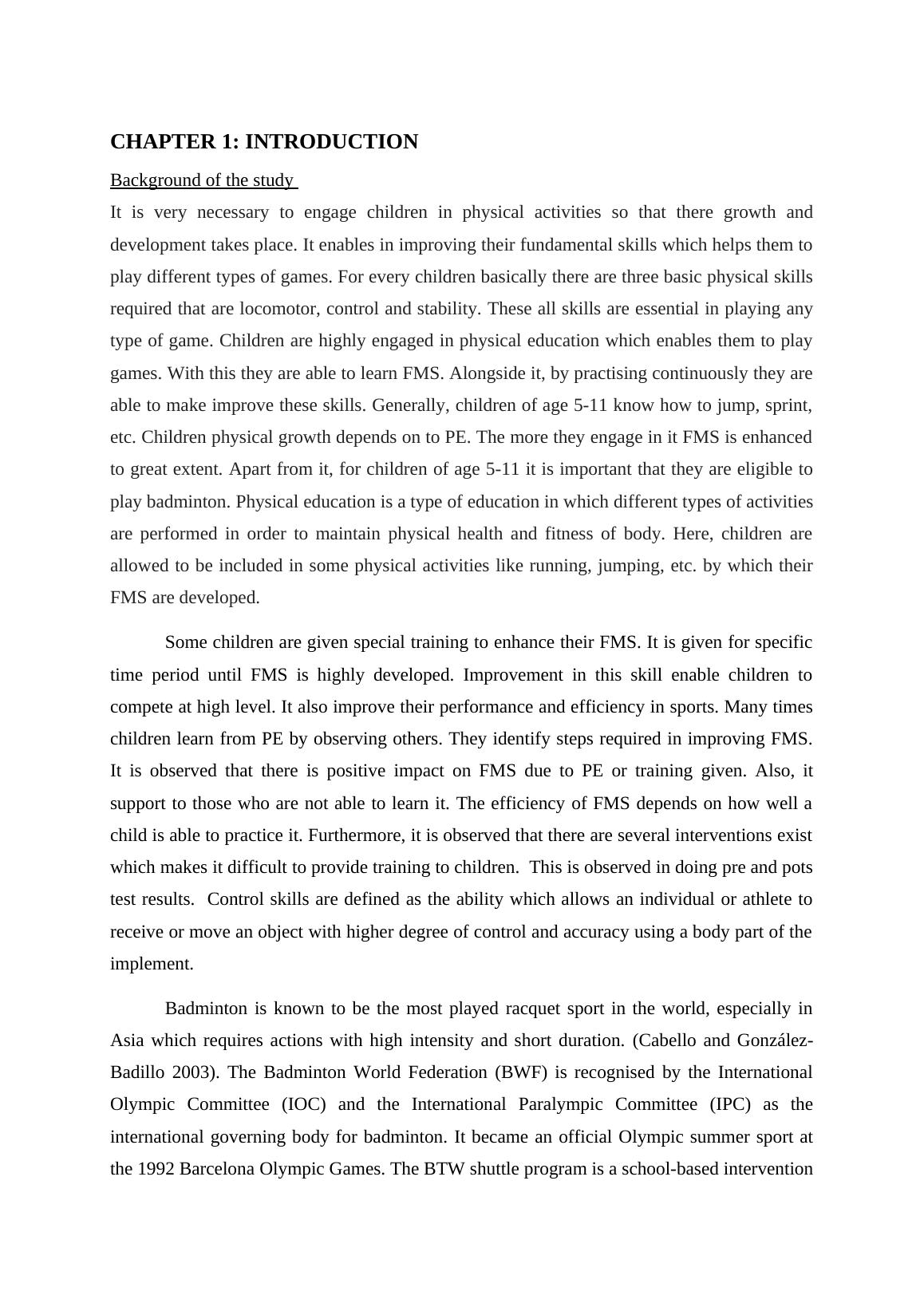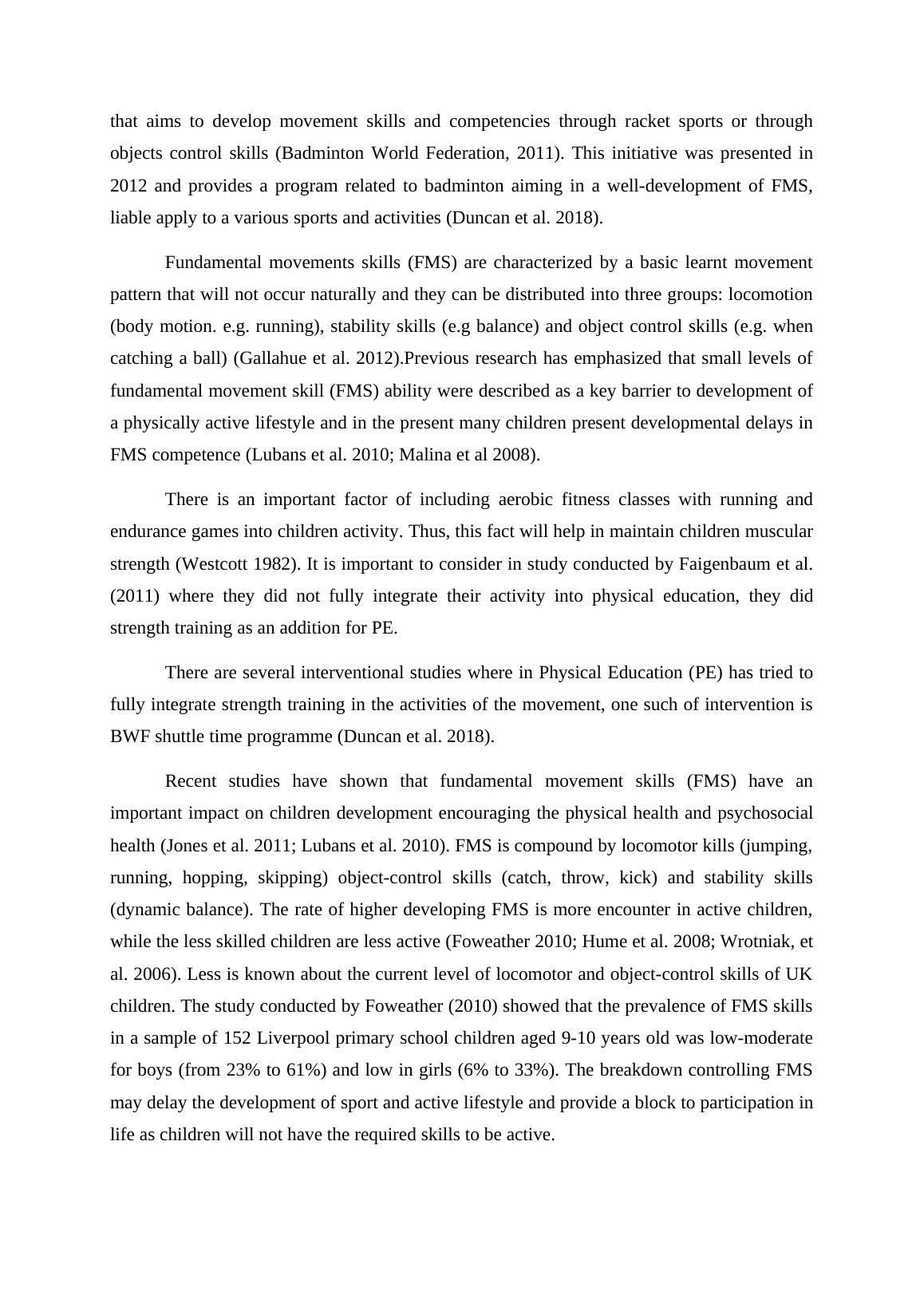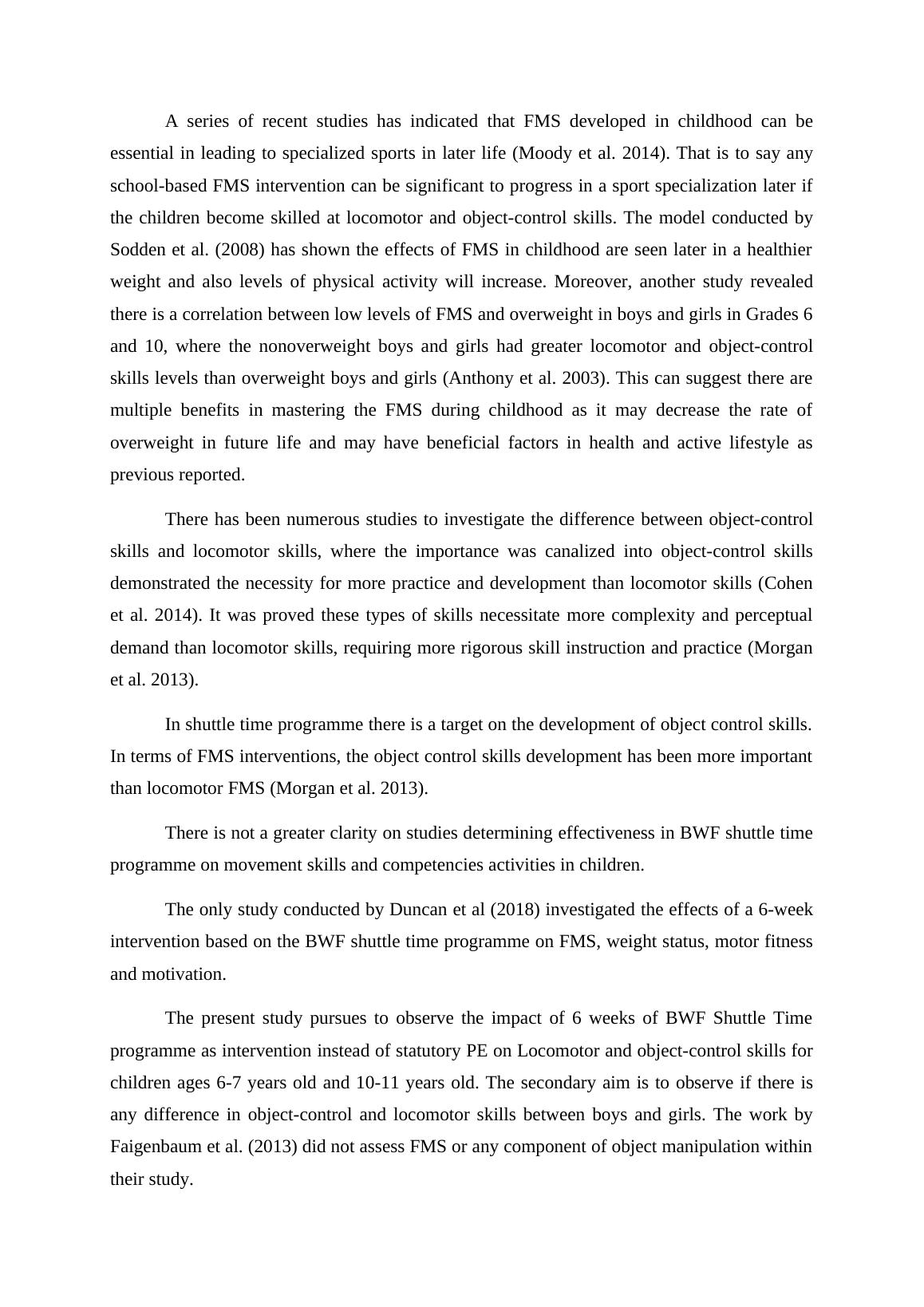Impact of Badminton Assignment PDF
11 Pages3473 Words97 Views
Added on 2021-02-21
Impact of Badminton Assignment PDF
Added on 2021-02-21
ShareRelated Documents
The impact of Badminton World FederationShuttle Time Programme in object control skills vslocomotor skills on children

CHAPTER 1: INTRODUCTIONBackground of the study It is very necessary to engage children in physical activities so that there growth anddevelopment takes place. It enables in improving their fundamental skills which helps them toplay different types of games. For every children basically there are three basic physical skillsrequired that are locomotor, control and stability. These all skills are essential in playing anytype of game. Children are highly engaged in physical education which enables them to playgames. With this they are able to learn FMS. Alongside it, by practising continuously they areable to make improve these skills. Generally, children of age 5-11 know how to jump, sprint,etc. Children physical growth depends on to PE. The more they engage in it FMS is enhancedto great extent. Apart from it, for children of age 5-11 it is important that they are eligible toplay badminton. Physical education is a type of education in which different types of activitiesare performed in order to maintain physical health and fitness of body. Here, children areallowed to be included in some physical activities like running, jumping, etc. by which theirFMS are developed. Some children are given special training to enhance their FMS. It is given for specifictime period until FMS is highly developed. Improvement in this skill enable children tocompete at high level. It also improve their performance and efficiency in sports. Many timeschildren learn from PE by observing others. They identify steps required in improving FMS.It is observed that there is positive impact on FMS due to PE or training given. Also, itsupport to those who are not able to learn it. The efficiency of FMS depends on how well achild is able to practice it. Furthermore, it is observed that there are several interventions existwhich makes it difficult to provide training to children. This is observed in doing pre and potstest results. Control skills are defined as the ability which allows an individual or athlete toreceive or move an object with higher degree of control and accuracy using a body part of theimplement.Badminton is known to be the most played racquet sport in the world, especially inAsia which requires actions with high intensity and short duration. (Cabello and González-Badillo 2003). The Badminton World Federation (BWF) is recognised by the InternationalOlympic Committee (IOC) and the International Paralympic Committee (IPC) as theinternational governing body for badminton. It became an official Olympic summer sport atthe 1992 Barcelona Olympic Games.The BTW shuttle program is a school-based intervention

that aims to develop movement skills and competencies through racket sports or throughobjects control skills (Badminton World Federation, 2011). This initiative was presented in2012 and provides a program related to badminton aiming in a well-development of FMS,liable apply to a various sports and activities (Duncan et al. 2018).Fundamental movements skills (FMS) are characterized by a basic learnt movementpattern that will not occur naturally and they can be distributed into three groups: locomotion(body motion. e.g. running), stability skills (e.g balance) and object control skills (e.g. whencatching a ball) (Gallahue et al. 2012).Previous research has emphasized that small levels offundamental movement skill (FMS) ability were described as a key barrier to development ofa physically active lifestyle and in the present many children present developmental delays inFMS competence (Lubans et al. 2010; Malina et al 2008). There is an important factor of including aerobic fitness classes with running andendurance games into children activity. Thus, this fact will help in maintain children muscularstrength (Westcott 1982). It is important to consider in study conducted by Faigenbaum et al.(2011) where they did not fully integrate their activity into physical education, they didstrength training as an addition for PE.There are several interventional studies where in Physical Education (PE) has tried tofully integrate strength training in the activities of the movement, one such of intervention isBWF shuttle time programme (Duncan et al. 2018).Recent studies have shown that fundamental movement skills (FMS) have animportant impact on children development encouraging the physical health and psychosocialhealth (Jones et al. 2011; Lubans et al. 2010). FMS is compound by locomotor kills (jumping,running, hopping, skipping) object-control skills (catch, throw, kick) and stability skills(dynamic balance). The rate of higher developing FMS is more encounter in active children,while the less skilled children are less active (Foweather 2010; Hume et al. 2008; Wrotniak, etal. 2006). Less is known about the current level of locomotor and object-control skills of UKchildren. The study conducted by Foweather (2010) showed that the prevalence of FMS skillsin a sample of 152 Liverpool primary school children aged 9-10 years old was low-moderatefor boys (from 23% to 61%) and low in girls (6% to 33%). The breakdown controlling FMSmay delay the development of sport and active lifestyle and provide a block to participation inlife as children will not have the required skills to be active.

A series of recent studies has indicated that FMS developed in childhood can beessential in leading to specialized sports in later life (Moody et al. 2014). That is to say anyschool-based FMS intervention can be significant to progress in a sport specialization later ifthe children become skilled at locomotor and object-control skills. The model conducted bySodden et al. (2008) has shown the effects of FMS in childhood are seen later in a healthierweight and also levels of physical activity will increase. Moreover, another study revealedthere is a correlation between low levels of FMS and overweight in boys and girls in Grades 6and 10, where the nonoverweight boys and girls had greater locomotor and object-controlskills levels than overweight boys and girls (Anthony et al. 2003). This can suggest there aremultiple benefits in mastering the FMS during childhood as it may decrease the rate ofoverweight in future life and may have beneficial factors in health and active lifestyle asprevious reported.There has been numerous studies to investigate the difference between object-controlskills and locomotor skills, where the importance was canalized into object-control skillsdemonstrated the necessity for more practice and development than locomotor skills (Cohenet al. 2014). It was proved these types of skills necessitate more complexity and perceptualdemand than locomotor skills, requiring more rigorous skill instruction and practice (Morganet al. 2013).In shuttle time programme there is a target on the development of object control skills.In terms of FMS interventions, the object control skills development has been more importantthan locomotor FMS (Morgan et al. 2013).There is not a greater clarity on studies determining effectiveness in BWF shuttle timeprogramme on movement skills and competencies activities in children.The only study conducted by Duncan et al (2018) investigated the effects of a 6-weekintervention based on the BWF shuttle time programme on FMS, weight status, motor fitnessand motivation.The present study pursues to observe the impact of 6 weeks of BWF Shuttle Timeprogramme as intervention instead of statutory PE on Locomotor and object-control skills forchildren ages 6-7 years old and 10-11 years old. The secondary aim is to observe if there isany difference in object-control and locomotor skills between boys and girls. The work byFaigenbaum et al. (2013) did not assess FMS or any component of object manipulation withintheir study.

End of preview
Want to access all the pages? Upload your documents or become a member.
Related Documents
Impact of Badminton World Federation Shuttle Time Programme on Object Control Skills vs Locomotor Skills in Childrenlg...
|11
|3473
|81
The importance of physical training programs and Effective sports management for sports Olympics: An UAE perspectivelg...
|11
|3301
|143
